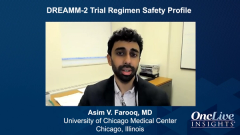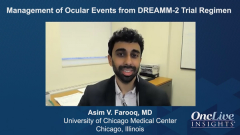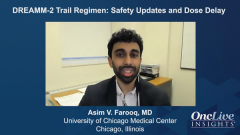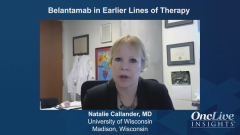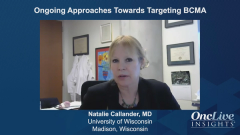
Management of Ocular Events From DREAMM-2 Regimen
Episodes in this series

Sagar Lonial, MD, FACP: As with any monoclonal antibody, we know that there can be other adverse events in addition to the keratopathy I just mentioned. If we look at data in terms of other adverse events, the second most common after keratopathy was hematologic toxicity, which is not a surprise. Thrombocytopenia was noted as well as neutropenia, and in some cases, anemia. We know that, unlike other monoclonal antibodies that have been administered in myeloma, the rate of infusion-related reactions is quite low. They tend to occur with the first dose, but it can be reduced significantly with the use of steroids and antihistamines. It is a relatively low event, especially considering what we see with daratumumab or with elotuzumab for first event infusion-related reactions.
Asim V. Farooq, MD: In terms of the long-term follow-up of ocular events, as a result of the fact that this drug, belantamab mafodotin, has not been available, you do not have data for it for multiple years. We do not know what the potential long-term adverse effects are going to be. However, for those patients who were followed beyond the limitations of the trial, we saw that these lesions tended to resolve and that their visual acuity returned back to baseline.
The key point is that a significant percentage of patients develop these lesions, but once there is either a dose hold followed by dose reduction or if the treatment is stopped due to completion of therapy or another reason, those patients went back to baseline.
The optimal management and monitoring strategy of ocular events requires a degree of coordination between the ophthalmologist or optometrist and the hematology-oncology specialist. This is, in part, due to the fact that patients need to have an eye exam at baseline and then prior to every infusion, which is generally scheduled once every 3 weeks.
This requires some cooperation on the part of the ophthalmologist to agree to take on these patients. I would argue as an ophthalmologist and for my ophthalmology colleagues that this is an opportunity to have an impact on patients that is somewhat unique compared to what we normally do in our clinical practice because we hope to facilitate a reasonable quality of vision and quality of life for patients with multiple myeloma who are on belantamab, which they may be getting after having failed 3, 4, or 5 other agents. Our examination and our reporting back to the oncologist is critical for the patient to either get their next dose of the medication or for us to recommend a dose hold because of the impact that it is having on their cornea and on their vision.
That coordination and communication is important because once the patient is scheduled and an ophthalmologist agrees to take on this patient, each time that patient has an appointment, the ophthalmologist will follow the grading and dose modification guidelines that are provided in the prescriber information for belantamab and then report back to the oncologist about what they see. As an example, in my practice at the University of Chicago Medical Center, there is pretty frequent and regular communication between myself and the oncology team, which includes the nurses as well as the attending physician, in terms of what the patient is experiencing both subjectively and objectively as well as the grading of corneal lesions and what my ultimate assessment is about whether a dose hold would be recommended based on the criteria.
With that being said, as an ophthalmologist, I also understand that my job is basically to perform the grading and assessment of the corneal changes and relay that information both to the patient as well as the oncologist. The decision to treat or to do a dose hold is up to them, so that communication link has to be strong to make this all work in the best interest of the patient.
The specific management of keratopathy at the present time, with the knowledge that we have, is most heavily reliant on dose holds and dose modification. The reason for this is that we have seen in the DREAMM-2 study as well as from seeing patients post-FDA approval that when the drug is held, the corneal changes seem to resolve. In some patients, they resolve faster than in others, but we think that this is a dose-dependent phenomenon.
This is why, in the package insert in the prescriber information, the guidance in terms of management is this: once there is grade 2 or higher keratopathy, meaning microcyst-like epithelial changes, the presence of those lesions or decrease in visual acuity associated with those lesions will warrant a hold of the dose. Once the dose is held and the cornea and vision go back to baseline, then the medication will be resumed at a lower dose.
Another aspect of treatment for these patients that has been recommended is eye lubrication, preferably with preservative-free artificial tears. The reason for that is that we have seen patients with dry eye, and the DREAMM-2 study data showed that patients with a history of dry eye had a greater chance of developing grade 2 or higher microcyst-like changes within the epithelium. Because of this relationship, we as ophthalmologists have encouraged patients to be on lubricated eyedrops, preferably preservative-free artificial tears, as frequently as 4 to 6 times a day.
If I look to the future, I hope and suspect that there will be more directed therapies that will become available for the type of corneal changes that we are seeing as the exact pathophysiology of the changes are confirmed and once directed therapies are developed.
Transcript Edited for Clarity




